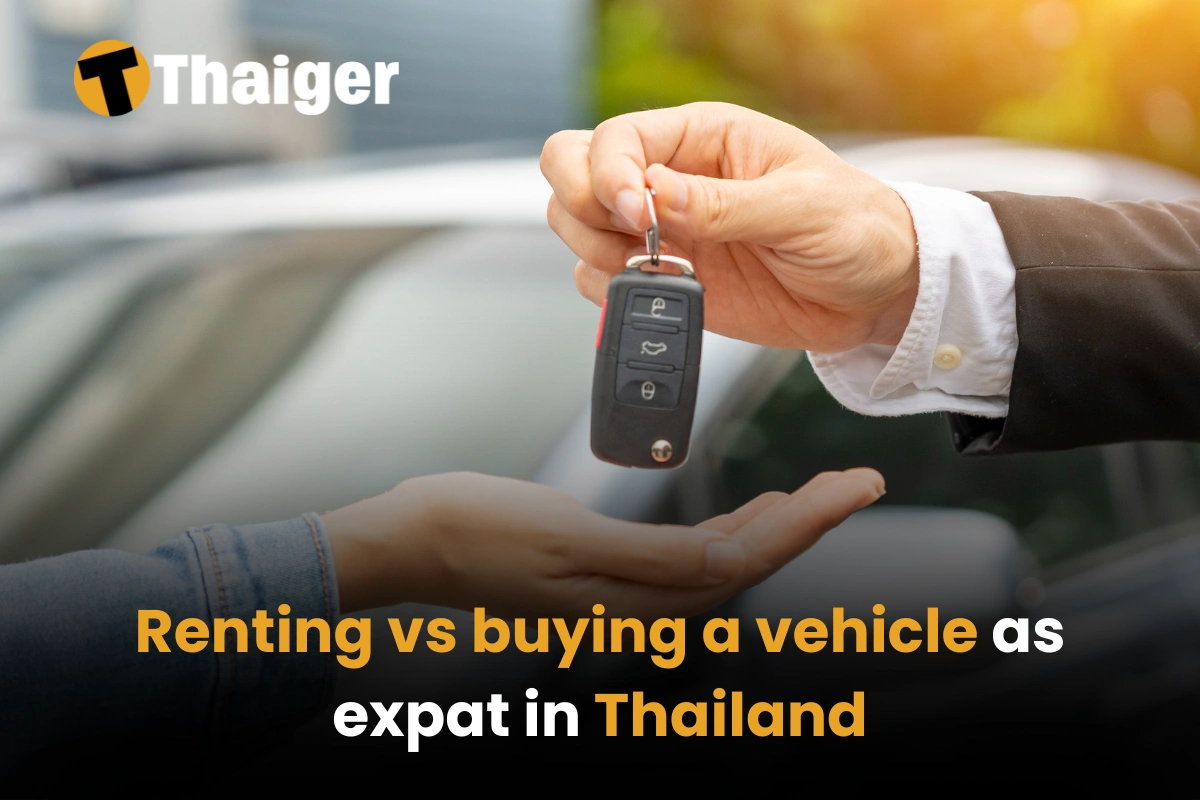Renting vs buying a vehicle as expat in Thailand

As an expatriate in Thailand, deciding whether to rent or buy a vehicle is an important choice that depends on factors such as the length of your stay, financial situation, lifestyle preferences, and mobility needs. This article explores the advantages and disadvantages of both options, providing the insights you need to make an informed decision.
Overview of vehicle options in Thailand
Expatriates in Thailand can choose between renting or buying a vehicle, each with its own benefits and challenges. Renting offers flexibility with short-term agreements, making it a good choice for those who only need a vehicle temporarily. Buying, on the other hand, provides ownership and can save money in the long run. Understanding these options helps expats decide based on their travel needs and budget in Thailand’s dynamic environment.
Renting a vehicle

Process for renting a vehicle as an expat
Renting a vehicle as an expat in Thailand involves a few straightforward steps:
- Choose a rental company: Select a reputable company, such as Thai Rent-A-Car or international chains like Hertz and Sixt.
- Make a reservation: Book your vehicle in advance, especially during peak tourist seasons.
- Provide documentation: Present a valid driving license (an International Driving Permit is recommended), your passport, and a credit card for payment and deposit.
- Review the rental agreement: Carefully read and sign the agreement, which outlines the terms and conditions.
- Inspect the vehicle: Check for any existing damage and ensure it is documented in the rental agreement before driving off.
- Consider additional insurance: Evaluate if you need extra insurance beyond the basic coverage typically included.
- Return the vehicle: Bring the car back on time and in good condition to avoid extra charges or penalties.
Advantages and disadvantages of vehicle rental
Renting a vehicle in Thailand offers several advantages and disadvantages for expats to consider.
| Aspect | Advantages | Disadvantages |
| Flexibility | Flexible agreements for daily, weekly, or monthly durations. | Long-term rentals can become expensive over time. |
| Cost-effectiveness | No large upfront costs like down payments or registration fees. | Ongoing rental payments may exceed the cost of buying over time. |
| Maintenance & insurance | Typically included in the rental agreement, reducing stress. | Hidden fees for extras like GPS or insurance upgrades may apply. |
| Vehicle variety | Wide range of vehicles to suit different preferences and budgets. | Limited customisation options. |
| No depreciation | No worries about resale value or vehicle depreciation. | Restrictions on mileage and driving locations may apply. |
Buying a vehicle

Advantages & disadvantages of buying a vehicle
Deciding whether to buy a vehicle in Thailand comes with its own set of advantages and disadvantages that can significantly impact your experience as an expatriate.
| Aspect | Advantages | Disadvantages |
| Long-term investment | Eliminates ongoing rental fees after purchase. | Requires significant upfront costs, including taxes and insurance. |
| Customisation options | Allows personalisation to suit preferences. | Limited by vehicle model and availability of parts. |
| No mileage restrictions | Travel freely without extra charges for distance. | Higher maintenance costs over time, especially with extensive travel. |
| Resale value potential | Opportunity to regain some investment by selling the vehicle. | Depreciation reduces resale value over time. |
| Sense of stability | Provides a sense of ownership and stability for long-term stays. | Involves navigating complex regulations and paperwork. |
Cost comparison: renting vs buying

Comparing the costs of renting and buying a vehicle in Thailand helps highlight the financial differences. The table below shows the typical expenses for each option.
| Cost factor | Renting (Monthly) | Buying (One-Time) |
|---|---|---|
| Average rental cost | 20,000 Thai baht – 30,000 Thai baht | 600,000 Thai baht – 1 million Thai baht |
| Insurance | Included | 10,000 Thai baht – 30,000/year Thai baht |
| Maintenance | Included | Varies (5,000 Thai baht – 15,000/year Thai baht) |
| Registration fees | N/A | 5,000 Thai baht – 10,000 Thai baht |
| Depreciation | N/A | 10% – 15% per year |
Key considerations when deciding

For expatriates in Thailand, deciding between renting or buying a vehicle affects mobility, finances, and overall experience. Below are the key factors to help make an informed choice.
Length of stay
- Short-term: Renting is more practical for stays under a year.
- Long-term: Buying is more cost-effective for longer stays or frequent returns to Thailand.
Financial constraints
- Consider whether you can handle upfront costs for buying versus ongoing rental payments.
- Compare insurance premiums included in rentals to those required for ownership.
Lifestyle preferences
- Frequent travellers: Owning offers greater convenience for regular travel.
- Occasional use: Renting may be enough for limited transportation needs.
Choosing between renting and buying a vehicle in Thailand depends on your stay duration, budget, and travel needs. Renting works well for short-term visitors or occasional use, offering convenience with maintenance and insurance included, though costs can add up over time. Buying suits those staying long-term, providing ownership, freedom from mileage limits, and potential resale value, but it requires higher upfront costs and navigating paperwork. Expats should consider their financial situation, travel habits, and lifestyle to decide which option best meets their needs.
For insights on another important choice for expatriates—renting versus buying property in Thailand—explore this guide on property options for expats.
FAQ for renting vs buying a vehicle as expat in Thailand
What are the main differences between renting and buying a vehicle in Thailand?
- Renting offers flexibility with short-term agreements and includes maintenance and insurance, making it ideal for temporary stays. However, costs can accumulate over time.
- Buying provides ownership, freedom from mileage restrictions, and potential resale value but requires significant upfront investment and involves navigating complex regulations.
What are the age requirements for renting a vehicle?
Most rental companies require drivers to be at least 21 years old, though some may set the minimum age at 23.
Is it possible to sell my vehicle later if I buy it?
Yes, selling your vehicle is possible, but keep in mind that depreciation will reduce its resale value over time
What documents do I need to rent a vehicle?
To rent a vehicle, you will need a valid International Driving Permit, your passport, and a credit card for payment and deposit.
































